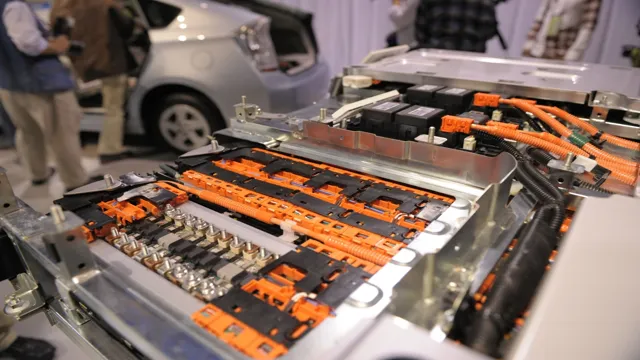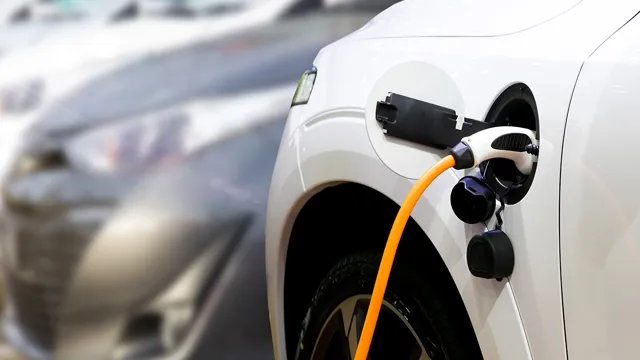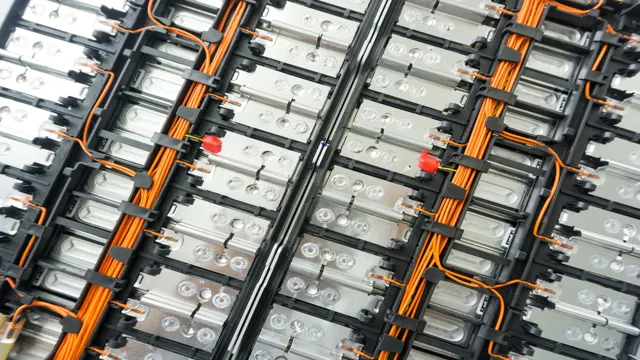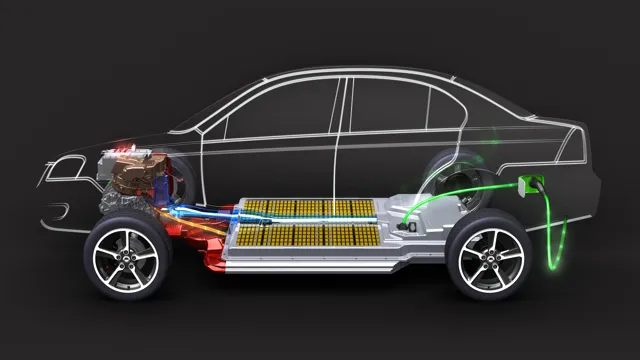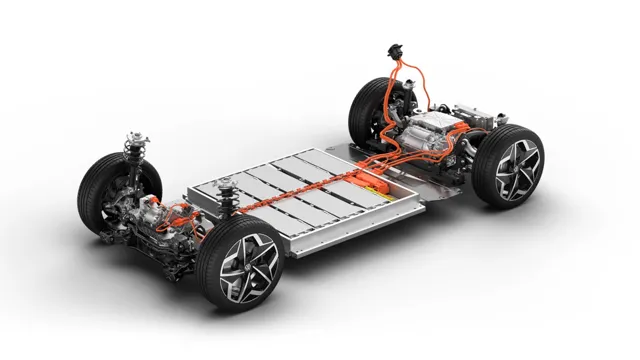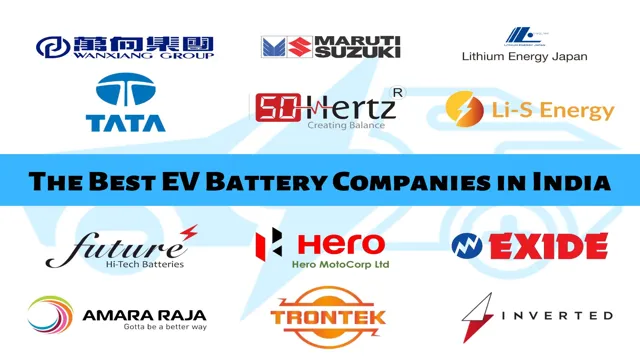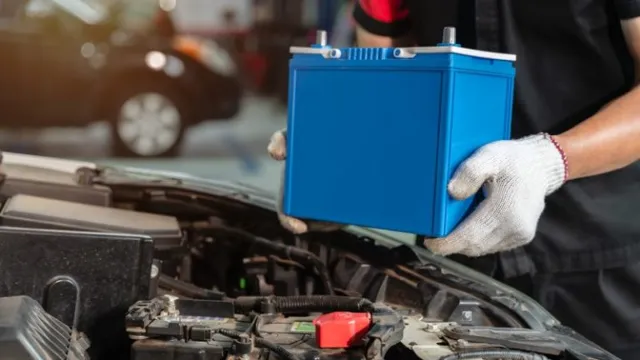Power Up Your Ride and Save the Planet: The Impact of Batteries for Electric Cars on Pollution
Electric car batteries have gained significant popularity in recent years due to their eco-friendliness and role in reducing greenhouse gas emissions. However, the use of these batteries has sparked debates about their impact on the environment and pollution levels. Many misconceptions surrounding electric car batteries and pollution have been circulating, making it difficult to determine fact from fiction.
In this blog post, we will examine the myths and facts surrounding electric car batteries and pollution. We will explore whether the production, use, and disposal of these batteries contribute to a significant increase in pollution levels and how they impact the environment. Additionally, we will highlight the measures being taken to reduce the impact of electric car batteries on the environment.
So, are electric car batteries as environmentally friendly as they seem? Is there more to the story than what we hear in the mainstream media? Join us as we uncover the truth about electric car batteries and their impact on pollution.
The Basics
When it comes to electric cars, one of the most important components is its battery. However, the production and disposal of these batteries can have negative impacts on the environment. These batteries contain several chemicals, including lithium, cobalt, and nickel, which can become pollutants when not disposed of properly.
In fact, improperly disposed batteries can leak these chemicals into the soil and water, causing harm to both wildlife and humans. Additionally, the production of these batteries can also contribute to greenhouse gas emissions and other forms of pollution. However, there are steps being taken to address these concerns, such as the development of more sustainable battery materials and improved recycling processes.
It’s important to consider the environmental impacts of batteries for electric cars to promote a cleaner and healthier future for all.
How electric car batteries work
If you’re curious about how electric car batteries work, you’ve come to the right place! The basics are relatively straightforward: electric cars rely on a large battery pack to provide power to an electric motor that propels the vehicle. This battery pack is made up of individual cells that are connected together and managed by a battery management system (BMS) to maximize their efficiency and longevity. The cells themselves contain chemicals that react to produce a flow of electrons, which is what provides the electric current that powers the car.
The most common type of cell used in electric car batteries is called a lithium-ion cell, which has a high energy density and can charge and discharge quickly. This means that electric cars can have a reasonably long driving range and can be recharged relatively quickly at a charging station or even at home using a dedicated charging unit.
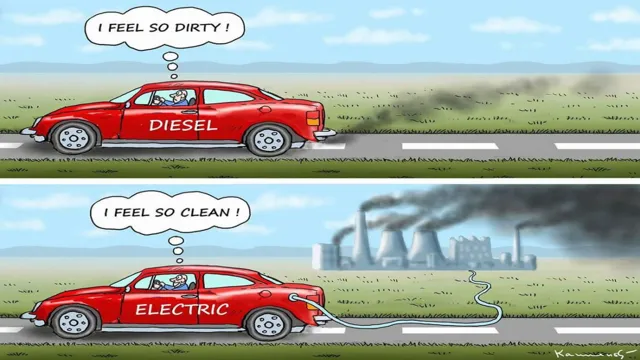
What is pollution?
Pollution can be defined as the introduction of harmful substances or contaminants into the environment, either naturally or by human activities. These substances can cause damage to living organisms, the natural surroundings, and even to human health. Pollution may come in different forms, such as air pollution, water pollution, soil pollution, and even noise pollution.
For example, air pollution refers to the presence of harmful gases, particulate matter, or other pollutants in the air we breathe. Water pollution results from the dumping of waste products, chemicals, and other pollutants into freshwater, oceans, or other bodies of water. Soil pollution occurs when toxic substances or chemicals are dumped into the soil, while noise pollution refers to excessive noise that can adversely affect human health and the environment.
In summary, pollution poses a significant threat to the environment and human health and must be addressed through effective and sustainable measures.
Myths about Electric Car Batteries
There are many misconceptions about batteries for electric cars and their impact on the environment. One of the biggest myths is that these batteries are a significant source of pollution. While it’s true that the production of these batteries does require mining and processing of materials that can produce pollution, they actually have much lower emissions over their lifetime when compared to gasoline engines.
Electric cars produce no tailpipe emissions, and when charged with renewable energy sources, they have the potential to significantly reduce greenhouse gas emissions. Moreover, advancements in battery technology are making these batteries more efficient and less harmful to the environment. While they may not be perfect, batteries for electric cars are a step in the right direction towards a sustainable future.
Myth: Electric car batteries are worse for the environment than gasoline cars
Electric car batteries have been subjected to a lot of false claims and myths over the years. One of the most common myths is that they are worse for the environment compared to gasoline cars. However, this is not true.
Firstly, electric car batteries are made using materials that can be recycled, minimizing their impact on the environment. Additionally, electric cars emit fewer emissions than gasoline cars, making them more environmentally friendly. Furthermore, the electricity required to charge these cars can be derived from renewable sources such as solar and wind power.
It’s important to note that gasoline cars also have batteries that eventually need to be disposed of, and they emit harmful pollutants that electric cars don’t. So, it’s clear that electric car batteries are not worse for the environment; in fact, they are the better option.
Myth: Electric car batteries produce more pollution during manufacturing
One common myth about electric car batteries is that they produce more pollution during manufacturing compared to traditional gasoline cars. However, this misconception is simply not true. It’s important to note that manufacturing any car is not a clean process and involves emissions and waste.
However, studies have shown that the overall production emissions from electric car batteries are lower than those produced by gasoline cars. A study conducted by the Union of Concerned Scientists revealed that electric cars emit less than half the carbon dioxide emissions produced by gasoline cars over their lifetime. Additionally, as more renewable energy sources are used in manufacturing electric car batteries, the production emissions are decreasing even further.
So, don’t let this myth stop you from considering an electric car – it’s a great option for reducing your carbon footprint.
Myth: Electric car batteries cannot be recycled
Electric car batteries are often the subject of myths and misconceptions. One common myth is that these batteries cannot be recycled. However, this is entirely untrue.
In fact, recycling electric car batteries is a crucial part of sustainable transportation. While the process for recycling these batteries is more complex than traditional lead-acid batteries, it is still highly feasible. Lithium-ion batteries, which are commonly used in electric cars, can be recycled through various methods, including pyrometallurgical, hydrometallurgical, and mechanical processes.
These methods allow for the recovery of valuable materials such as nickel, cobalt, and lithium. With increasing demand for electric vehicles globally, recycling batteries will become even more important to ensure we’re not depleting natural resources. So rest assured, electric car batteries can and are being recycled.
Fact: Electric Car Batteries Reduce Pollution
It is a fact that batteries for electric cars can significantly reduce pollution. Unlike traditional gasoline-powered cars that produce harmful emissions, electric cars utilize batteries to power their engines, emitting zero pollutants as a result. These batteries are designed to be highly efficient, allowing electric cars to travel long distances without needing frequent recharging.
In addition, the production of electric car batteries also has environmental benefits. Electric car battery production requires less energy and produces fewer greenhouse gas emissions compared to traditional gasoline cars. By choosing an electric car powered by a high-performing battery, drivers can take an important step towards reducing their carbon footprint and helping to protect our planet’s environment.
Less air pollution from tailpipes
Electric car batteries are an excellent way to reduce air pollution from tailpipes. It’s a fact that electric cars are cleaner than their gas-powered counterparts. When we drive gas-powered cars, we release harmful pollutants into the air that can hurt both the environment and our health.
Electric cars, on the other hand, run on electricity, which produces zero tailpipe emissions. Moreover, electric cars produce less carbon dioxide, which is a greenhouse gas that leads to global warming. So, by switching to an electric car powered by a battery, we can reduce air pollution and contribute to a cleaner world.
While some may argue that electric car battery production leads to some pollution, it’s worth noting that electric cars’ overall lifetime emissions can be up to 70% lower than those of gasoline cars. So, if you care about the environment and want to breathe cleaner air while driving, consider making the switch to an electric car for a sustainable future.
Offsets carbon emissions from battery production
Electric car batteries are often touted as a green alternative to fossil fuel-powered vehicles. And with good reason. Contrary to popular belief, the production of electric car batteries does not emit significant carbon emissions.
In fact, electric car batteries have been designed to offset any carbon emissions that are produced during manufacturing, making them a truly sustainable choice for drivers who want to reduce their carbon footprint. This is because, unlike traditional car batteries, electric car batteries are made using a variety of recyclable materials such as nickel, cobalt, and lithium. These materials can be easily reused and recycled, eliminating the need for toxic chemicals and heavy metals to be released into the environment.
As such, not only do electric car batteries reduce pollution by powering cars without emitting harmful exhaust fumes, but they also help alleviate the environmental impact of battery production. So, if you’re considering making the switch to an electric car, you can be sure that you’re making a green and sustainable choice for you and the planet.
Conclusion: Electric Car Batteries are the Cleaner Choice
In the electrified future of transportation, batteries for electric cars will play a key role in reducing pollution and emissions. However, it is important to recognize that these batteries are not without their environmental impact. From the mining of raw materials to the disposal of used batteries, there are challenges that must be addressed to ensure a sustainable and eco-friendly approach to electric mobility.
So the next time you zip around town in your electric ride, remember that while the air you breathe is cleaner, there is still work to be done to minimize pollution in the battery lifecycle. It’s time to recharge our efforts and spark change for a greener tomorrow!”
FAQs
How do batteries for electric cars contribute to reducing pollution?
Batteries for electric cars are typically charged using electricity from clean energy sources like wind and solar power, which significantly reduces greenhouse gas emissions compared to traditional fossil fuels. Additionally, because electric cars produce no tailpipe emissions, they also help reduce air pollution in urban areas.
What types of batteries are used in electric cars?
Lithium-ion batteries are the most commonly used type of battery in electric cars. These batteries are lightweight, have high energy density, and can be charged quickly. Other types of batteries used in electric cars include nickel-metal hydride, solid-state, and hydrogen fuel cells.
How long do batteries for electric cars last?
The lifespan of a battery for an electric car can vary depending on factors such as how often it’s charged, how it’s driven, and the climate it’s used in. On average, most electric car batteries are expected to last around 100,000 to 200,000 miles before needing to be replaced.
Does the production of batteries for electric cars produce pollution?
While the production of batteries for electric cars does produce some pollution, it’s generally much less than the pollution created during the production of traditional car engines. Additionally, as the production of batteries improves and becomes more efficient, the amount of pollution produced is likely to decrease further.
